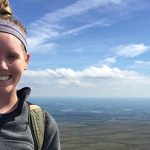
“There’s a dirty little secret about wood,” says TallWood Design Institute researcher Lech Muszynski. “It burns.”
Muszynski studies the fire resistance of cross-laminated timber. When discussing this topic, he often refers to a photo from the great San Francisco fire in 1906. In the photo, two melted steel beams lay across a wooden beam.
The beam burned, while the steel softened. But Muszynski says the old photo proves the difference between flammability and fire safety.
“Materials that do not burn may be less fire safe than wood that does burn, but keeps its load bearing capacity much better,” he says. “In this case, the steel lost its load bearing capacity, while the wood, which didn’t burn completely, retains its ability to bear a load and saves the space below from being crushed.”
Despite this evidence from the early 1900s and recent research conducted in Europe, the American public is still concerned about fire when it comes to wooden buildings, and American construction companies don’t have enough data to ensure tall wooden buildings are up to code. Muszynski hopes to provide this data and put minds at ease with his latest research project, which tests the fire resistance of cross-laminated timber floors and walls.
“The point of my project is not to generate new science, but to provide a large-scale demonstration of how cross-laminated timber panels react to fire,” Muszynski says.
When Muszynski says “large scale,” he means it. Many of the panels he tested in a large furnace at the Western Fire Center in Kelso, Washington were too large to be transported in one piece, and had to be assembled on site.
The samples went into the furnace completely unprotected with any kind of fire-proofing materials typically used in wooden construction. Thermocouples, which measure temperature, were attached to the panels to collect data while the panels were exposed to fire.
Muszynski said that each panel experienced similar, gradual and predictable charring rates: the surface of the panels darkened within two minutes, caught fire and eventually a layer of char formed on the surface of the wood.
“Every floor panel we tested survived two hours of fire exposure,” Muszynski says. “After two hours we cut it off and inspected the sample. Only one wall sample failed after 90 minutes, and that’s still pretty good.”
The next step of the project is evaluating the charred samples. For this, Muszynski employed two Oregon State undergraduates.
“At first he tried to talk me out of the job,” says senior forestry student Cassie Holloway. “We were starting in the middle of summer, and doing this kind of heavy manual labor in the heat is pretty difficult.”
But Holloway and her partner prevailed. They cut each sample into one-foot by one-foot samples and evaluated the char depth to ensure consistency with data from the thermocouples.
Holloway first heard about CLT in her junior seminar class and was immediately intrigued.
“Growing up, I was very interested in conservation and sustainability,” Hollway says. “I think it’s awesome that people are using renewable materials to build up instead of out. I was really excited to be able to work on this project.”
Once sampling is completed, Muszynski says he will work to create a map of the char depth of each sample. Next, he hopes to test the fire resistance of connections used in CLT construction.
“Our ultimate goal is to make the TallWood Design Institute the one-stop place for testing anything mass-timber including CLT and glulam and whatever comes next,” Muszynski says. “This must include fire testing.”





